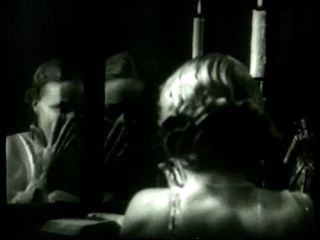The MacGuffin: News and Comment (26/Apr/2008)
(c) Ken Mogg (2008)
April 26
Stephen Rebello's fine book 'Alfred Hitchcock and the Making of Psycho' (1990), currently being filmed, mentions James Whale's The Old Dark House (1932) but only in passing, as one of the famous Universal shockers which proved 'astonishingly profitable' in the early 1930s, starting with Dracula and Frankenstein (both 1931). So here, as a follow-up to last week's entry, are some thoughts mainly about a possible direct influence of The Old Dark House on Psycho. The latter was, of course, filmed by Hitchcock at Universal (though it was released by Paramount), a connection to Whale's film of which Hitchcock would have been well aware. After all, Psycho is itself an 'Old Dark House' movie, whose predecessor was based on a novel, 'Benighted', by J.B. Priestley (who briefly worked on Jamaica Inn [1939]), whose screenplay was by Hitchcock's friend and colleague Benn W. Levy, and whose director was an earlier British expatriate in Hollywood (like Hitchcock himself). Also, the cast of Whale's film includes the buoyant Charles Laughton, who would star in both Jamaica Inn and The Paradine Case (1947). Scarcely less obvious a connection between the two films is how both of them include a rainstorm which brings their respective travellers to the out-of-the-way house (or nearby motel) in the first place, seeking shelter. The atmospheric storm, suggestive of inner turmoil, has respectable precedents in literature and melodrama, which both films in effect acknowledge (and take advantage of) while implying a sardonic distance from such 'conventions'. The expression 'tongue-in-cheek' about covers it, I think. Nonetheless, both films also employ other melodramatic devices to good effect. Remember the scary moment in Psycho when Lila (Vera Miles) is exploring Mother's bedroom and is startled by her own doubled reflection? (Earlier, we had heard Mother's voice berating her son for wanting to entertain 'strange young girls ... by candlelight'.) Well, there's an almost exact precedent in The Old Dark House when Margaret (Gloria Stuart), one of the 'benighted' travellers, has accompanied the sinister Miss Femm (Eva Moore) to the latter's bedroom in order to change her wet clothes. Rebecca Femm proves to be a cackling old puritan, who seeing Margaret in her satin underwear jabs a finger above Margaret's bosom and tells her, 'That flesh, too, will rot, soon enough.' Whereupon Rebecca goes out, leaving a trembling Margaret alone with a candle. But a moment later Margaret is even more startled when she sits down at the dressing table with its main mirror and side-wings. (See frame-capture below.) Catching sight of her several reflections, she thinks Miss Femm has come back - and, sure enough, there, seemingly reflected, is the cackling old crone, hideously distorted. (For good measure, director Whale throws in a couple of shots of the hulking family-servant, Morgan, played by a bearded Boris Karloff, as if he, too, were lurking in the nearby shadows.) Margaret flees. Meanwhile, we have learnt that the house has other bedrooms upstairs, in one of which lies the bedridden patriarch Sir Roderick Femm, aged 102, played by an actor whom the credits call 'John Dudgeon'. In fact, to suggest the character's frailty, and to give him 'a small voice, like a child's', the resourceful Whale cast the actress Elspeth Dudgeon. (The IMDb reports that she later had bit parts in Foreign Correspondent [1940] and The Paradine Case.) Here, quite likely, was Hitchcock's inspiration and licence for using several actors, both male and female, to play the voice of 'Mother' in Psycho. (For details, see Chapter 8 of Rebello's book.) Also, we learn from Sir Roderick the following information: 'Two of my children died when they were 20, and then other things happened. ... Madness came.' This statement is never altogether illuminated, not even in Priestley's novel. (There, the corresponding passage receives even less elaboration.) It hangs as a mysterious back-story over the events of the film, much as in Psycho the full story of Norman Bates's upbringing, and his subsequent history, including his relation with his mother - possibly incestuous - is never spelt out. However, one thing does become clear. The madness referred to by Sir Roderick is embodied in at least one more family member, the son Saul (Brember Wills), who is imprisoned in another of the house's rooms and who will shortly escape to attack the 'benighted' visitors. The hand-to-hand tussle of Saul with Penderel (Melvyn Douglas) in The Old Dark House anticipates the hand-to-hand tussle of Norman (Tony Perkins) with Sam (John Gavin) that climaxes Psycho. Okay. I have said nothing so far about the other member of the Femm family, the neurasthenic but essentially sane Horace Femm (Ernest Thesiger), brother of Rebecca and Saul. Roughly, he is the equivalent of the sane side of Norman Bates. And now here's some (I hope not gratuitous) information I recently learned. It's well known that Robert Bloch, author of 'Psycho', based his novel on the recent Ed Gein case. (Again, see Rebello on this.) However, less well known is that Bloch may also have part-based the character of Norman on one Calvin Thomas Beck. The latter was a horror and science fiction buff who published and edited the respected fan magazine 'Castle of Frankenstein' and was totally dominated by his mother, even after his father had passed away - in circumstances reminiscent of The Old Dark House! The whole matter has been (lengthily) written up by Tom Weaver, himself a respected horror buff, on the Web. Click here (and see in particular the paragraph beginning, '"Then she went on to say ..."'): http://www.bmonster.com/horror29.html
This material is copyright of Ken Mogg and the Hitchcock Scholars/'MacGuffin' website (home page) and is archived with the permission of the copyright holder. |

